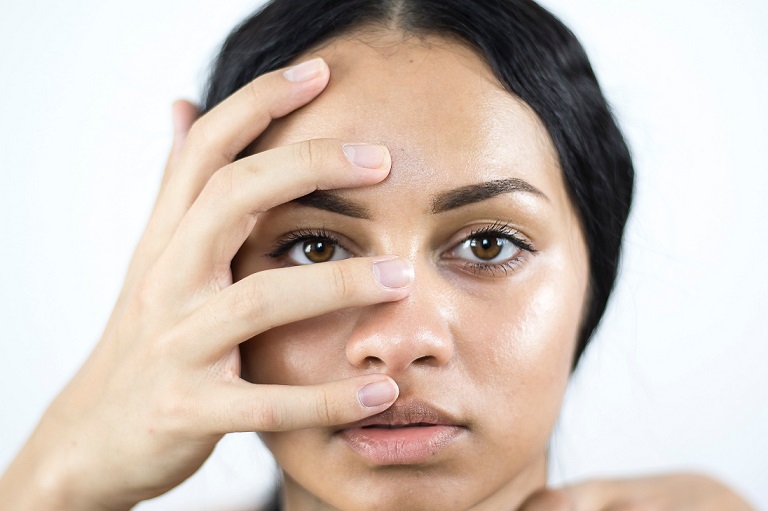Figuring Out Your Skin Type Can Feel Daunting!
Skin is generally classified into one of four categories: Normal, oily, dry, or combination. Though, in reality, there are seven different skin types. No need to worry… here’s a quick breakdown of the seven basic skin types, how to tell which best describes you, and some tips to help find the right products that work for you. Who doesn’t want to combat potential issues without causing more problems?
7 Basic Skin Types
1. Normal
How to Tell: Normal skin has a good balance of moisture, small pores and an even tone. You don’t experience many breakouts and your skin doesn’t tend to react negatively to new products or weather changes. You don’t feel like you need to constantly moisturize or blot oil from your face. Your skin is firm, with minimal fine lines and wrinkles.
Skin Care Tips: LUCKY YOU! With normal skin, you experience almost no sensitivity, dryness, or oiliness. Your skin is resilient, balanced, and able to handle change without skipping a beat. You don’t see reactions to trying new products and changes in weather. Try different products that target what your main concerns are, and enjoy doing so! The skincare world is your playground!
2. Oily
How to Tell: Does your skin always seem to be glowing? Oily skin is identified by an excess of oil on the face. You may begin to feel greasy only a few hours after washing. Oil will build up on your face throughout the day. You might find yourself constantly blotting your face and having a difficult time with make-up staying put.
Skin Care Tips: With oily skin, you spend a majority of your time trying to control excess oil and a shiny look. Although there are benefits to having oily skin, such as being less prone to wrinkles, it can frustrate many of us. Here are a few things to keep in mind. Wash your face regularly, keep blotting papers and medicated pads handy, and use facial masks. While people with oily skin tend to steer clear of moisturizers for fear that their skin will look greasier, using the right moisturizers can benefit this type of skin. Look for an oil-free moisturizer to help keep the greasy feeling at bay.
“No matter your skin type, I hope to inspire you to be confident in your own skin and to love yourself with or without makeup.” @msamybell

3. Dry
How to Tell: Dry skin suffers from a lack of natural moisture and there’s little oil to act as a surface barrier and lock in moisture. Symptoms often include tightness, flakiness, sensitivity, and irritation. Dry skin can be caused by a lack of hydration, environmental factors, or can be a chronic condition, like eczema.
Skin Care Tips: To care for dry skin, you’ll want to use ointments, creams, and lotions as moisturizers. These will work by trapping existing moisture in your skin. To trap this much-needed moisture, you need to apply a moisturizer within a few minutes of washing your face or showering.
4. Combination
How to Tell: If you are a blend of both oily and dry skin, you likely suffer from combination skin. Is your skin dry in certain areas, while oily in others? Combination skin is most easily defined by an oily T-zone (the strip across the forehead and the line down the nose) and dry or normal skin on the rest of the face. Often times, the pores on your nose are visibly larger than the pores on your cheeks and jawline.
Skin Care Tips: Try an oil-free moisturizer so you don’t add any additional oil to your already oily T-Zone area. The name of the game with combination skin is balance. Use masks to help with balance. You can even spot treat with different masks in the areas you need. For example use a clarifying mask for oily skin in your T-zone area and a rejuvenation mask for the rest of our face.
Found your skin type yet? If not, no worries, there are more…
5. Acne-Prone Skin
How to Tell: If you get frequent breakouts, even if it is just more than 5 blemishes a month, you likely have acne-prone skin. This means that your pores tend to clog easily, making you more susceptible to whiteheads, blackheads or cysts than other skin types. You can have oily, dry, or combination skin and be prone to acne as well.
Important Note: Acne in adults may be treated differently than acne in teens.
Skin Care Tips: Use cleansers specifically formulated to treat acne. A gentle exfoliant will also help minimize breakouts. Gently cleanse your face to avoid trauma to existing breakouts, and use topical gel to treat and lighten acne scarring. Look for acne fighting products containing ingredients like salicylic acid and benzoyl peroxide.
6. Sensitive
How to Tell: If you notice that your skin reacts to changes in environment or cosmetics, shows signs of redness, rashes, bumps, or flush skin, you are likely someone who suffers from sensitive skin. You may also see signs of dry, flaky and irritated skin.
Skin Care Tips: Since you’re more prone to irritation, redness, stinging, burning, or acne breakouts, avoid fragrances and irritants like alcohol or products containing harsh ingredients. Look for products with fewer additives, and seek our those with things like skin-soothing peptides that will calm dry skin, reduce visible signs of redness, and defend against environmental aggressors. When using a new product, always, always, do a test run on a small, inconspicuous patch of skin (like behind your ear) before applying all over your face.
Last, but definitely not least, a skin type that we all face at one point in life.
7. Mature
How to Tell: While not everyone’s skin ages at the same pace, signs of aging are inevitable. You might notice a wrinkle here and there from a lack of collagen and elasticity as we age, or more dryness than in your younger years. Mature skin can show signs of aging through sagging, dark spots, dullness, and dehydration.
Skin Care Tips: Mature skin requires enhanced skin care to help reverse skin damage and tackle future damage. There’s no wrong time to find an anti-aging skincare routine! It is important to use a regimen with restorative treatments, helping to boost collagen and minimize fine lines and wrinkles. For example, Hyaluronic Acid can help boost hydration and draw moisture to the skin. Retinol will help with cell turnover and prompts collagen production.
“Live, Laugh, Love… without it you have nothing!”
@msamybell

I hope this helped you pinpoint your skin type and gave you some good tips to manage it! If you liked this post, I think you’d also love, “The Growing Popularity of Facial Masks”. What skin type are you and what have you found that works? Comment below to help us all conquer our skin care needs!
Send Amy Bell A Message


